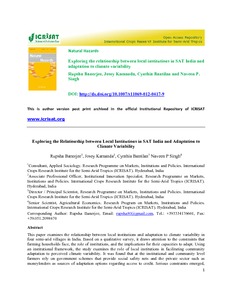Exploring the relationship between local institutions in SAT India and adaptation to climate variability
Abstract
This paper examines the relationship between local institutions and adaptation to climate variability in four semi-arid villages in India. Based on a qualitative survey, it draws attention to the constraints that farming households face, the role of institutions, and the implications for their capacities to adapt. Using an institutional framework, the study examines the role of local institutions in facilitating community adaptation to perceived climate variability. It was found that at the institutional and community level farmers rely on government schemes that provide social safety nets and the private sector such as moneylenders as sources of adaptation options regarding access to credit. Serious constraints emerged, however, in terms of adaptation to what may be a more challenging future. These constraints were further explored by means of grounded theory. The lack of collective feeling and action has hindered bargaining for better market prices and the development of alternate livelihood options. The need for better financial inclusion and access to more formal systems of finance is necessary to increase the overall adaptive capacity of households. During crisis situations or climatic shocks, the absence of these systems means the sale of household assets and resources especially among small and landless groups of farmers. Overall, rural households perceive that public, civic, and private institutions play a significant role in shielding them against the adverse effects of climate variability. The perceived importance of different institutions is, however, different across different categories of farmers, women, and labourers

